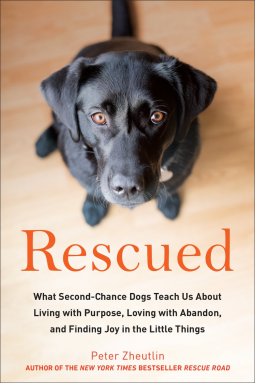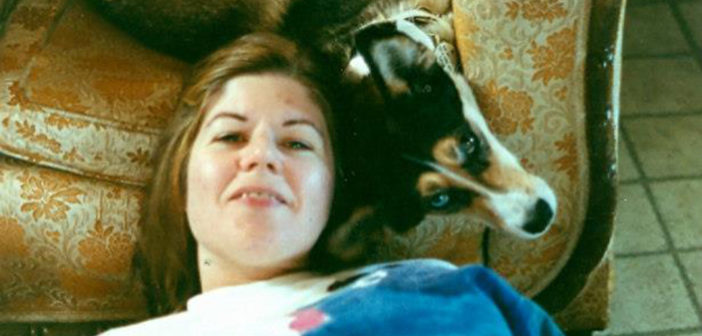Adapted with permission from RESCUED: What Second-Chance Dogs Teach us About Living with Purpose, Loving with Abandon, and Finding Joy in the Little Things by Peter Zheutlin.
 “Someone recently told me that bringing a dog or cat or other animal into your life is a contract with sadness,” Elissa Altman told me when we spoke in the summer of 2016. She and her partner Susan had just lost Addie, adopted when Addie was about seven. She was just shy of fifteen when she died.
“Someone recently told me that bringing a dog or cat or other animal into your life is a contract with sadness,” Elissa Altman told me when we spoke in the summer of 2016. She and her partner Susan had just lost Addie, adopted when Addie was about seven. She was just shy of fifteen when she died.
“Anyone who has watched an animal age doesn’t want to make the life/death decision,” Elissa said. “But they are dependent on us to give them lives of peace and happiness and safety and part of that is making sure their departure is one of peace and safety, too.”
The subject came up in the very first interview I did for this book with Staicey Scholtz of Vermillion, Ohio who, it will be remembered, adopted Jake, an eleven-and-a-half-year-old yellow Lab who had lived the first ten years of his life chained in a small yard behind a trailer home never knowing a moment’s joy. He had just eight months with Staicey and her husband Brad when he was diagnosed with osteosarcoma, an aggressive cancer. Jake had suffered so much in his life and Staicey and Brad wanted to be sure they helped Jake pass before the inevitable pain set in. After a life of suffering Jake, however briefly, knew love.
Staicey’s story, Jake’s really, hit home and it hit hard. From the moment he came into our lives and I contemplated growing old with Albie, in some small corner of my mind I feared what it would be like to lose him. And the more people I spoke with the more I heard stories of loss that had shaken people to the core and brought forth deep grief. Elissa Altman was certainly right when she told me that for all the joy they bring us in life, loving an animal is also a contract with sadness.
Before Albie I knew in some abstract way that losing a dog was, for its human companions, a true and profound loss. After all, people say the dog is “a member of the family” all the time. When I was a kid we lost two dogs, one to an accident and another to natural causes. But I still didn’t, as an adult, quite understand the depth of the grief that so often accompanies the loss of a dog. I figured it meant a few days or weeks of some sadness, but it could hardly compare, so I thought, to the grief that accompanies the loss of a parent, a loved one or a human friend. Yet I eventually came to realize that this isn’t necessarily true. Dogs, cats, horses – animals of all types – often become wonderfully and inexplicably integral parts of our lives and our families, and losing them can be devastating.
When Reilly died, the dog we cared for one weekend and who helped break my opposition to a dog of our own, our friends Anne Marie and Dave struggled to come to terms. He’d been with them since he was a puppy. For months Reilly’s dog bed with his favorite toys remained in their living room and his leash hung in its familiar place. They just couldn’t bear to put them away and they felt, and still feel, Reilly’s absence, acutely, every day. For some the best way to honor a dog’s memory is to get another. For many devoted to rescue, the best way to honor a dog’s memory is to save another. For Dave and Anne Marie, Reilly was simply irreplaceable and more than a year later the loss still stung.
When I spoke with Elissa Altman who had recently lost Addie, the wounds were even fresher. “When Addie became ill and had trouble breathing,” Elissa Altman told me, “I slept in bed with her with her head in my arms. When we made the decision to let her go I knew I’d be heartbroken, but I didn’t know how devastating it would be. I could hardly speak for a week. I almost couldn’t function. I had deadlines but I had to let myself fall apart.”
Elissa and Susan’s other rescue dog, Petey, had, for five years, only known life with Addie. “He always looked to Addie for confidence and social cues,” Elissa said. “He fell into a horrible depression.” Months later Petey was just coming out of it. Even Elissa mother, who didn’t live with Addie, fell apart.
“She was a huge presence,” said Elissa. “She was an intensely kind and compassionate animal.”
Dogs, like people, get old and sick and die, and that is part of adopting a dog we often don’t think about at the beginning. Most of us will outlive our dogs which means we will be their caregivers not only when they are young and spry and relatively healthy, but as they age and become infirm, too. It’s part of the deal.
It is a testament to the meaning of a dog’s life, and the role they play in our lives, that he or she is so deeply mourned by those who cared for and loved him (or her) and who were repaid in spades. Vast numbers of dogs in this country and around the world die lonely, painful, anonymous deaths without so much as a name and it is from such a fate that each dog rescued by a loving family is spared. But we know when we surrender our heart to a dog and take great joy in each of our days with them, that one day there will pain to bear and grief to endure. But death is part of life for all living things – as Buddhism teaches us, without suffering there is no joy, without left there is no right, without darkness there is no light, and without death there is no life. As hard as it can be at the end, who would regret all the years of love and pleasure that came before?
© 2017 by Peter Zheutlin. TarcherPerigee, an imprint of Penguin Random House.
Featured image courtesy Kim Bartlett / Animal People, Inc., showing Kim and late dog Zookie in 1990.





